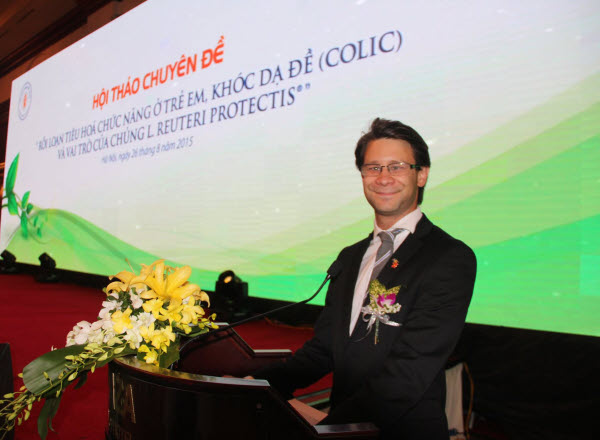
Vietnam’s Paediatric Society and Swedish company BioGaia organized a seminar on 26 August entitled “Functional gastrointestinal disorders in children, Colic and the role of L.reuteri Protectis”.
Attended by the Embassy of Sweden in Hanoi the event also attracted policy-makers, researchers and practitioners in the health sector.
L.reuteri Protectis has been clinically researched and proven as safe and effective in 4.420 new-borns. It’s been recommended by the World Gastroenterology Organisation in prevention and treatment of Colic symptoms in children.
Important international key opinion leaders informed the audience about the effects shown in studies with L. reuteri Protectis. The event resulted in public attention from state owned television news.

Speaking at the event, Björn Savlid, Second Secretary, Embassy of Sweden said: “Sweden has traditionally been a very strong and trusted country within life science, and our life science companies are known in Vietnam for their innovative solutions and the high quality of their products. It is with great pleasure to witness the launch of BioGaia’s products in Vietnam, which is truly an example of the type of innovative solutions that Sweden has to offer”.
Swedish BioGaia’s new Viatnamese partner BioVagen (subsidary of Vietphap) is in the process of launching BioGaia products (BioGaia ProTectis drops and Gastrus) in Vietnam.
The meaning of Probiotics is: ”For life”. Probiotics are live microorganisms that give health benefits when taken in adequate amounts. Common microorganisms used as probiotics are lactic acid bacteria and bifodobacteria.

Probiotics can be taken as food supplement to strengthen the immune system and the gut and oral microflora or to achieve a specific health effect. A condition for the good bacteria to contribute to health is that they survive all the way to the colon. Another important criterion for qualifying as a probiotic is that the health benefits of the bacteria must have been proven in clinical studies (in humans). The studies must have been made with exactly the same strain, or strains, and the same number of bacteria as in the final product.
